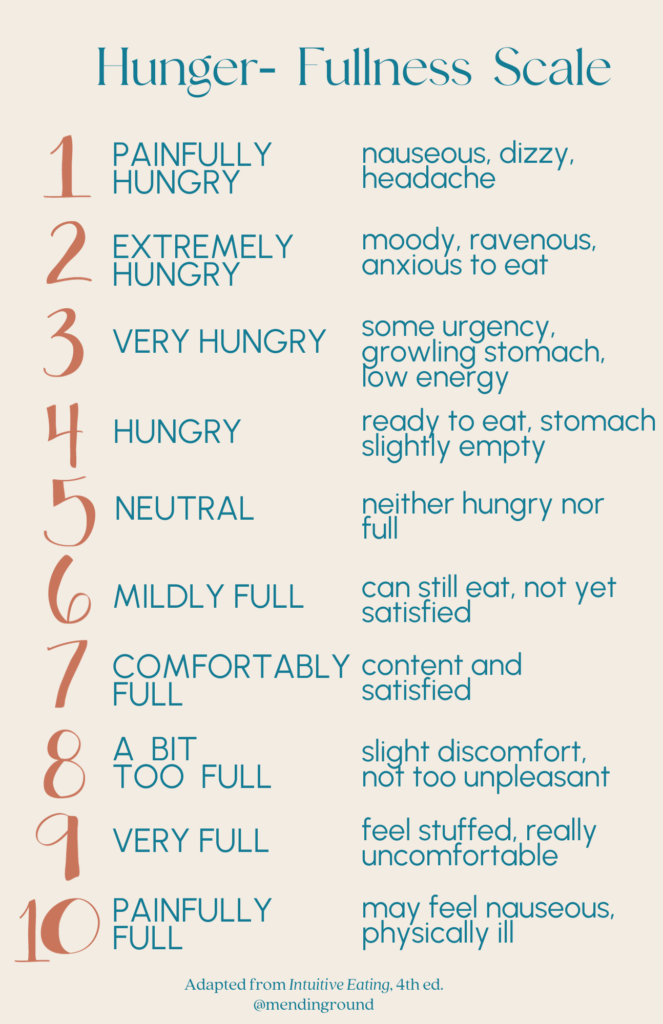
Part of becoming an intuitive eater involves developing a sense of flexibility and nuance around food. While the idea of honoring your hunger can be liberating, it can also present a great challenge to those still wrestling with the rigid rules of diet culture.
The 10 principles of intuitive eating offer a guide and framework for healing your relationship with food and body image. While the steps are numbered, they don’t need to be followed in order. Working on the second principle, honoring your hunger, can make the other principles, like making peace with food more accessible.
What we’ll cover:
Dieting and food restriction cause our body to believe that it is in a condition of food scarcity. Even though we may have easy and regular access to food, (unless you are food insecure which is a very real and unjust issue) dieting can lead our bodies to think that it is starving given the caloric deficit that many diets encourage. Our bodies are biologically wired to operate in this way. Our ancestors had to hunt and gather food and would have periods of feast and famine. Their bodies had to be efficient at storing energy (aka: calories) so they could survive. An insufficient amount of calories naturally signals to our body that food is scarce.
When food is restricted (either physically or mentally), it is common to feel more preoccupied with food. Lack of food causes your body to trigger a number of mechanisms that put it in primal hunger mode signaling to your brain that food is scarce. When you suddenly have access to food again, your body intuitively overeats as a way to protect and nourish itself. There is nothing wrong with that! It’s just your body trying to protect you. Thanks, body!
Ignoring hunger can have a number of detrimental effects on our body. As mentioned above, it can have the immediate effect of pushing our bodies towards overeating to compensate for the restriction of food caused by dieting. Overtime, it can also damage our interoceptive awareness, making our hunger cues more difficult to notice. This is yet another reason why dieting can be so harmful. It forces us to follow arbitrary rules, like when and what to eat, rather than listen to the natural cues provided by our bodies. It becomes very difficult to truly honor your hunger.
Here are a few ways you can work on honoring your hunger:
Important Note: This scale isn’t meant to be followed “perfectly” and it may not be appropriate for someone who is in recovery from an eating disorder or chronic dieting.

If all of this seems overwhelming, know that you don’t have to do this alone! Working with an intuitive eating aligned dietitian can be very helpful.
One caveat: while it is important to honor your hunger, this doesn’t mean that you should only eat when you’re physically hungry. Some people can get really caught up on the idea and turn this part of intuitive eating into the hunger-fullness diet. This is rigid and doesn’t allow for the different types of hunger: taste, practical, and emotional.
For some people, this can be one of the challenging areas of intuitive eating because it’s asking you to actively unlearn diet culture. Honoring your hunger and adequately nourishing our bodies is a vital step to making peace with all foods.
Get one-on-one support through our online nutrition counseling. Schedule a free Connection Call with us to see if we’re the right fit for you!
For more in-depth reading, check out our resources page.
This article was written and reviewed by Jasmine Hormati, MS, RD, CDN, a registered dietitian and Certified Intuitive Eating Counselor. She specializes in eating disorder recovery, healing from chronic dieting, and body image work using a weight-inclusive and intuitive eating approach. Jasmine earned her Bachelors of Science in Conservation and Resource Studies form University of California, Berkeley and her Master of Science in Nutrition and Public Health from Teachers College, Columbia University.

My team and I here to help you reconnect to your inner wisdom and feel more confident in your here-and-now body. Eating doesn’t have to be complicated or restrictive.
We’ll support you through your intuitive eating journey so you can make peace with food, movement, and your body so you can show up in your life as your most authentic self.
For more lessons and words of encouragement, sign up for my nutrition newsletter!

mendinground nutrition sits on the traditional and unceded lands of the Lenape people, now called New York, New York. We honor the people who originally stewarded the land and are committed to creating a more equitable world.
Copyright 2024 Mendinground Nutrition